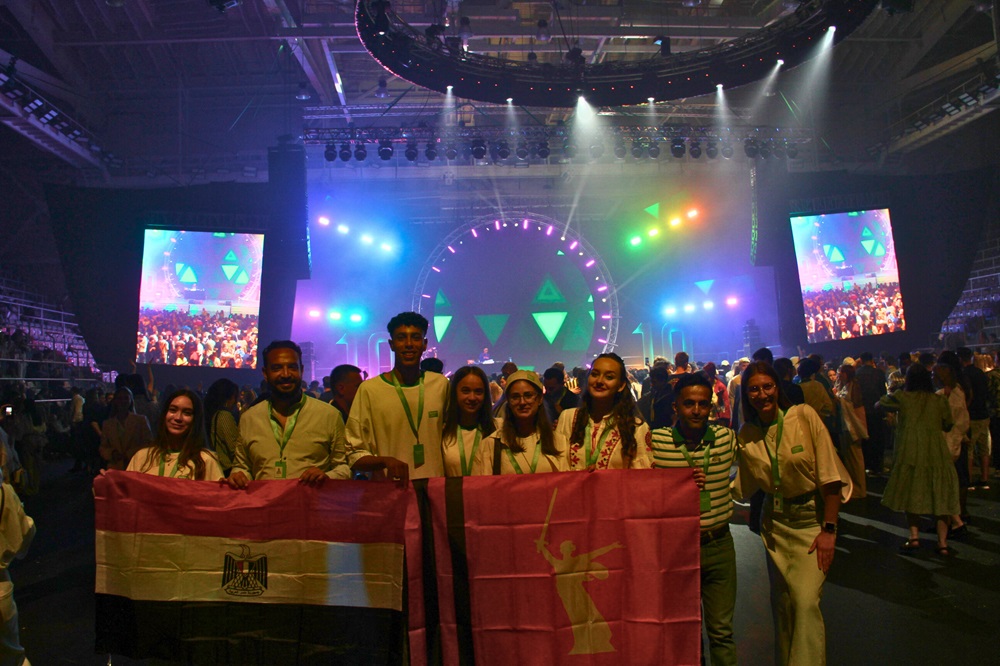Written by: Tehzeb Hussain Bercha
Posted on: July 16, 2025 |
Participants at the opening ceremony of Eurasia Global 2025
Alexander Pushkin famously said, “Empower your mind anywhere, anytime.” I believe travel does just that: it sparks creativity, lifts the spirit and cultivates inner peace. It’s not just about seeing new places, but about embracing emotions, traditions and memories, and embarking on a personal journey of self‑discovery.
I am fortunate that I got a second chance to visit Orenburg, Russia, to attend the Eurasia Global 2025, from June 24 to June 30, on the invitation of the Government of the Orenburg Region, the World Youth Festival Directorate, and the Russian Federal Agency for Youth Affairs (Rosmolodezh). Orenburg, a southwestern region of Russia, boasts a unique location, spanning across two continents in the heart of Eurasia. In Orenburg, I visited places that honor Yuri Gagarin, the first human in space, and strolled in the same landscapes that once inspired the legendary Pushkin. During my travels, I discovered unspoiled beauty in Orenburg that captivates the onlookers with its vast grasslands, scenic mountains, crystal-clear rivers and lush green landscape, which serves as the last refuge to Earth’s wild Przewalski’s horses.
Returning to Orenburg after last year’s visit felt like opening a familiar novel and finding the margins newly annotated. The trip promised not just reunion but deeper immersion: a chance to see how much my own lens and Orenburg’s story had sharpened in seven short months.
Grand Opening Ceremony: Sports Culture Complex Orenburzhye
On 24 June, the Orenburg Region hosted the 10th International Youth Forum “Eurasia Global” with a vibrant opening ceremony. The event featured the Russian national anthem, a colorful flag parade, regional performances and Orenburg’s traditional Karavay bread, symbolizing hospitality. Orenburg region’s Governor, Yevgeny Solntsev, welcomed guests, promising to showcase the region’s cultural richness. A message from Foreign Minister Sergey Lavrov highlighted the forum’s role in fostering cultural exchange, mutual trust and cooperation under the theme “Uniting to Shape a Multipolar World.”
I was truly struck by how actively the Russian government and regional bodies support their youth, not just in words, but through real action. Over 80 regions took part in the Eurasia Global 2025 Forum, reflecting the commitment of the Russian federation to empower its youth. One story that stood out was Darya Valanitskis, a young participant from the remote village of Chuvanskoye, who traveled for a week using four modes of transport, which was an inspirational example of determination and the forum’s inclusive spirit.
“Discover Orenburg Region” Excursion: Marsovo Polye Sports Arena
We traded city lights for the golden sun of the Pre-Ural Steppe, where nature commands quiet reverence. The June breeze carried wild thyme and onion across open grasslands, as saiga antelope flickered like mirages. At Luna Landscape Park in Pronkino, chalk cliffs gleamed under the midday sun, casting an otherworldly glow. Here, tradition and wilderness coexist: wooden homes nestled in open land and animals roaming free. Even a runaway drone and laughing volunteers could not break the calm. But more than the scenery, it was the shared wonder of our group that truly defined the journey.
Concert of the Orenburg State Academic Folk Choir at Orenburg Regional Philharmonic Hall
The concert “The Ural River” brought tradition to life, blending regional folklore into a rich, moving symphony. As Yevgeny Derbenko’s music swelled, dancers flowed across the stage, their embroidered shawls rippling like the river itself. Every step told a story: elegant, grounded and full of spirit. The rhythm of the steppe echoed through their boots, and by the end, the crowd was clapping along, swept up in the energy.
What struck me most in Russia was the deep cultural soul: literature, classical music, theatre, and philosophy aren’t just pastimes, they’re part of everyday life. This quiet reverence for ideas and art gave my journey a depth I hadn’t expected.
City Tours in Orenburg
Our tour of Orenburg unfolded like a story, each stop revealing a layer of its character. We began at the workshop of the famous Orenburg downy shawl, where delicate craft meets tradition. Meeting the soft-coated goats behind the shawls added a tactile connection to this heritage.
Next, we visited the Rostropovich Family House Museum, where one of the 20th century’s greatest cellists, Mstislav Rostropovich, was born. In the quiet rooms of his childhood home, music and memory blended. A virtual concert brought his brilliance to life, offering a glimpse into how this city shaped a world-renowned artist.
We ended at the Hermitage–Eurasia Museum, home to artifacts from across Russia. Among them, the polished jasper from the Urals stood out – stones so vivid they looked like landscapes frozen in color. As we admired antiques inside, rain began to pour. By the time we stepped out, the streets sparkled. Instead of hiding, we wandered down Pravda Street, letting the rain and city wrap around us. That quiet, rain-soaked walk became one of our most lasting memories.
Together, these moments revealed Orenburg not just as a historic city, but as a place where art, nature and memory are still very much alive.
Flavors, Friendships, and Footsteps: Discovering Orenburg One Moment at a Time
The “Flavors of Orenburg” festival was more than a feast, it was a joyful mix of food, culture and community. Held in front of the Orenburg History Museum near Pushkin’s monument, the setting echoed history. Historians say Pushkin spent 19 days in Orenburg, writing poems that earned the city the title ‘Inspiration of Pushkin’.
Forum participants danced between food stalls with their cheeks glowing and stomachs full, as folk music filled the air. Accordions and Dombras played alongside a beatboxer, showing that tradition and TikTok can happily share the stage. Between bites, I tried pottery glazing, my bowl turned out lopsided but proudly bore a camel, a perfect souvenir from a day full of flavor, heritage and creativity.
After the festival, Alinka, a Moroccan friend from my group, and I explored Orenburg’s famous pedestrian museum street, a 1,790-meter path lined with old buildings, sculptures and open-air exhibits. It felt like walking through the city’s cultural heartbeat.
The forum also gave me the chance to meet incredible people from around the world: Mohamed Fadlallah from Egypt, Kukhar Ksenia Sergeevna from Ivanovo, Stefan Todorcevic from Serbia, Maria Yakovleva from Pskov and many others. Later, the closing ceremony in Lenin Square marked another unforgettable chapter in this rich, shared experience.
Train from Orenburg to Moscow
Traveling by train from Orenburg to Moscow was a rich and immersive experience that offered both comfort and a deeper look into Russia’s vast landscape. The 22-hour journey took me through open steppes, thick forests and quiet provincial towns, gradually shifting from the calm of the Urals to the pulse of Moscow. In my cabin, I was joined by two elderly Russian women whose warmth stayed with me. They shared home-cooked meals twice and even washed my coffee cup. Tasting Otvarnoy Kartofel (boiled potatoes), Russian traditional Rasolnik soup and Solyónye Ogurtsy (salted cucumbers) with them was simple yet unforgettable. Despite the language barrier, their kindness spoke volumes.
In Russia, guests are welcomed with generosity. Even unexpected visitors are greeted with a table full of homemade food, a custom that made me feel truly seen and cared for. Watching the countryside pass by, I caught glimpses of village life: wooden houses with tidy gardens, people tending their land, and vegetables growing in backyard plots. These quiet scenes revealed a side of Russia far removed from city life: honest, peaceful and grounded.
The train crossed through regions steeped in history and geography: Samara, Ulyanovsk, Penza and Ryazan, each offering a different glimpse into the country’s character. One thing that struck me was the presence of books in young people’s hands. While screens dominate most places, I saw many young Russians reading on the train. It was refreshing, a quiet reminder of how deeply literature remains valued here.
Although English was not widely spoken, the staff were respectful and helpful, and simple words and gestures were enough to get by. One of the best parts of the trip was reconnecting with Ms. Polina Zvoda, whom I had met earlier during the forum. She was seated in the cabin next to mine and quickly became a source of comfort and conversation. Fluent in English and full of kindness, she invited me to join her during a one-hour stop in Samara. We explored the streets together and she introduced me to a Russian soft drink, which she offered with a smile. That simple act of sharing turned into one of the most meaningful moments of the journey.
This train ride captured the essence of travel in Russia: slow, scenic and full of quiet depth. Returning to Russia for the second time felt like returning not just to a place, but to a more grounded version of myself. This country offers more than monuments and memories. It reveals itself layer by layer.
Orenburg, with its wide steppes, delicate shawls and moving music, became the emotional heart of my trip. But the broader journey added complexity: from Moscow’s towering business district, which I explored briefly on my own, to the rural landscapes seen through a train window. Russia lives between tradition and transformation. Whether in the quiet grace of a concert hall, the generosity of fellow passengers, or the timeless words of Pushkin, the country speaks in many ways.

